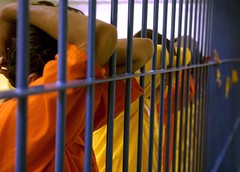In its bid to get the men fair trials or release, the clinic faces immense obstacles, not the least of which is a case file system that consists of paperwork tied together with bits of string. But even more worrying are the sectarian overtones: Most of the detainees are Sunni Arabs accused of terrorism-related offenses, and many claim to be targets of the Shiite Muslim-dominated security forces who they say used trumped-up charges to achieve sectarian "cleansing."
As the Bush administration touts security gains, the issue of the detainees raises questions about the Iraqi government's commitment to human rights, and undermines Sunni trust in the Shiite-led government -- a disenchantment that could even send some Iraqis into the arms of the waning insurgency.
What happens when the U.S. turns control over to the Shiite run Government?
A concern for the Iraqi lawyers working at the clinic is whether the Shiite-led government will foot the bill when U.S. funding runs dry.
The massive detention is also likely to increase hatred of the United States:
"Unsurprisingly, someone who's been deprived of their liberties for months and years without even a hint of due process . . . of course they're going to be angry," said Joseph Logan of Human Rights Watch, who recently spent time in the country researching the Iraqi justice system. "As the Americans found in 2003, the enemies you create are going to be there down the road. I think there is definitely political impact down the road from this."




